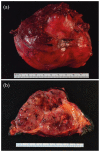Adrenocortical carcinoma: current state of the art, ongoing controversies, and future directions in diagnosis and treatment
- PMID: 34349894
- PMCID: PMC8295938
- DOI: 10.1177/20406223211033103
Adrenocortical carcinoma: current state of the art, ongoing controversies, and future directions in diagnosis and treatment
Abstract
Adrenocortical carcinoma (ACC) is a rare, aggressive malignancy with an annual incidence of ~1 case per million population. Differentiating between ACC and benign adrenocortical tumors can be challenging in patients who present with an incidentally discovered adrenal mass, due to the limited specificity of standard diagnostic imaging. Recently, urine steroid metabolite profiling has been prospectively validated as a novel diagnostic tool for the detection of malignancy with improved accuracy over current modalities. Surgery represents the only curative treatment for ACC, although local recurrence and metastases are common, even after a margin-negative resection is performed. Unlike other intra-abdominal cancers, the role of minimally invasive surgery and lymphadenectomy in ACC is controversial. Adjuvant therapy with the adrenolytic drug mitotane is used to reduce the risk of recurrence after surgery, although evidence supporting its efficacy is limited; it is also currently unclear whether all patients or a subset with the highest risk of recurrence should receive this treatment. Large-scale pan-genomic studies have yielded insights into the pathogenesis of ACC and have defined distinct molecular signatures associated with clinical outcomes that may be used to improve prognostication. For patients with advanced ACC, palliative combination chemotherapy with mitotane is the current standard of care; however, this is associated with poor response rates (RR). Knowledge from molecular profiling studies has been used to guide the development of novel targeted therapies; however, these have shown limited efficacy in early phase trials. As a result, there is an urgent unmet need for more effective therapies for patients with this devastating disease.
Keywords: adrenal incidentaloma; adrenalectomy; adrenocortical carcinoma; diagnosis; mitotane; treatment.
© The Author(s), 2021.
Conflict of interest statement
Conflict of interest statement: The authors declare that there is no conflict of interest.
Figures



References
-
- Kebebew E, Reiff E, Duh QY, et al.. Extent of disease at presentation and outcome for adrenocortical carcinoma: have we made progress? World J Surg 2006; 30: 872–878. - PubMed
-
- Kerkhofs TM, Verhoeven RH, Van der Zwan JM, et al.. Adrenocortical carcinoma: a population-based study on incidence and survival in the Netherlands since 1993. Eur J Cancer 2013; 49: 2579–2586. - PubMed
-
- Glenn JA, Else T, Hughes DT, et al.. Longitudinal patterns of recurrence in patients with adrenocortical carcinoma. Surgery 2019; 165: 186–195. - PubMed
-
- Fassnacht M, Dekkers OM, Else T, et al.. European Society of Endocrinology Clinical Practice Guidelines on the management of adrenocortical carcinoma in adults, in collaboration with the European Network for the Study of Adrenal Tumors. Eur J Endocrinol 2018; 179: G1–G46. - PubMed
Publication types
LinkOut - more resources
Full Text Sources
Research Materials

